
Suzzanna Martha Frederika van Osch was an Indonesian actress. Known as the "Queen of Indonesian horror", she is well-known in particular in Indonesia for portraying spirits, witches, and other supernatural beings. She was crowned the best female antagonist in Indonesian film industry along with Ruth Pelupessy and Mieke Wijaya.

Ratna Asmara, also known as Ratna Suska, was an Indonesian actress and director. Originally active in theatre, she starred in the romance film Kartinah (1940), which her first husband Andjar directed.

Fifi Young was an Indonesian actress of mixed French and Chinese descent who acted in at least 86 films over her 34-year career.

Miecke Marie De Rijder was an Indonesian actress, model, and politician who won three Citra Awards. She was crowned the best female antagonist in Indonesian film industry along with Suzzanna and Ruth Pelupessy. Wijaya began her career as a teenager and soared to popularity by partaking a role in Usmar Ismail's commercially successful Tiga Dara, her name became increasingly popular after starring in the soap opera Losmen in 1987.
The Citra Award for Best Supporting Actress is an award given at the Indonesian Film Festival (FFI) to Indonesian actresses for their achievements in a supporting role. The Citra Awards, described by Screen International as "Indonesia's equivalent to the Oscars", are the country's most prestigious film awards and are intended to recognize achievements in films as well as to draw public interest to the film industry.
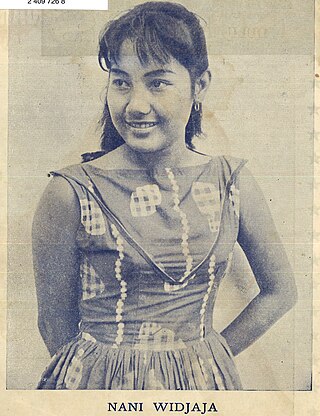
Nani Widjaja was an Indonesian actress and model who won two Citra Awards for Best Supporting Actress. She was best known for her role in television Bajaj Bajuri. She was the part of Classical Indonesian Cinema.
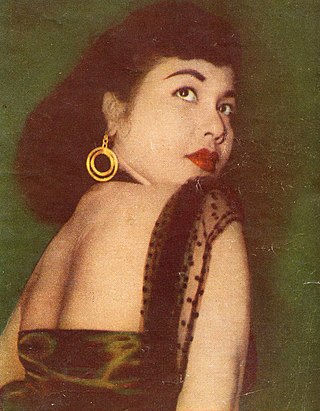
Dhalia was an Indonesian actress active for over fifty years. She was nominated for three Citra Awards at the Indonesian Film Festival, winning one.

Hadidjah was an Indonesian film actress best known for partnership with Moh Mochtar in seven films released by Java Industrial Film between 1939 and 1941. She was the mother of Citra Award-winning musician Idris Sardi.
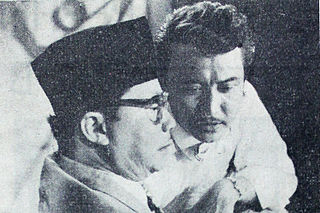
Tamu Agung is a 1955 Indonesian dramatic comedy film directed by Usmar Ismail. It stars Cassin Abbas, Nina Amora, M. Pandji Anom, and Chitra Dewi. The satirical political comedy, about the anticipation of the visit of a dignitary to a small isolated village in East Java, was critically acclaimed, although it was disliked by the government. The film, produced under the Perfini banner, was shot by cinematographer Max Tera. This movie is set in the modern day.

Boes Boestami was an Indonesian journalist and film actor. He was mostly known for his comedic roles.

Marlia Hardi was an Indonesian actress who was active from 1950s to 1980s. Born in the Magelang, she took to the stage in the 1940s before moving to Jakarta in 1949. Two years later she made her feature film debut in Untuk Sang Merah Putih. Over the next two decades she appeared in over seventy films, became recognized for her depictions of mothers, and received the Citra Award for Best Supporting Actress. Despite her productiveness, however, she sank into debt and committed suicide at the age of fifty-eight.
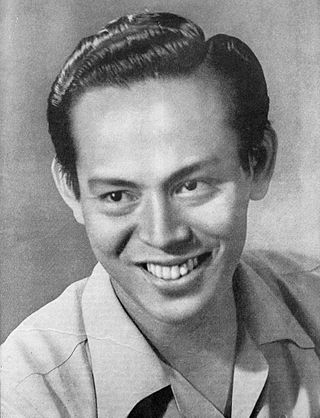
Raden Soekarno, better known as Rendra Karno, was an Indonesian actor. Born in Kutoarjo, Central Java, Soekarno entered the film industry in 1941, making his debut appearance in Union Films' Soeara Berbisa. Over the next forty years he appeared in more than fifty films. He was also involved in the theatre during the Japanese occupation of the Dutch East Indies and the Indonesian National Revolution. For his role in 1962's Bajangan di Waktu Fadjar, he was named best supporting actor at the 1963 Asian Film Festival in Tokyo.
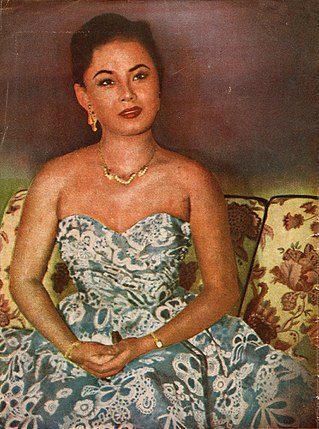
Netty Herawaty was an Indonesian actress who made more than fifty films between 1949 and 1986.

Darussalam was an Indonesian actor who appeared in more than seventy films in his forty-year career. Born in Bengkulu, he studied to be nurse before migrating to theatre during the Japanese occupation of the Dutch East Indies, marrying Netty Herawaty while with the troupe Irama Masa. The couple spent the remainder of the occupation and the ensuing revolution touring the archipelago with a number of troupes. In 1949, Darussalam and Herawaty made their feature film debut in Fred Young's Saputangan, appearing in seven further Young productions before migrating to Djamaluddin Malik's Persari. During their eight years with the company, Darussalam and Herawaty travelled to the Philippines and Singapore and found popularity among audiences, though Darussalam remained in his wife's shadow.

Tiga Dara is a 1957 Indonesian musical drama film starring Chitra Dewi, Mieke Wijaya, and Indriati Iskak. Directed by Usmar Ismail for Perfini, the film follows three sisters who live with their father and grandmother. When the eldest sister, Nunung, shows no interest in marrying, her family tries unsuccessfully to find a husband for her. Nunung initially rejects the advances of a young man named Toto, who instead dates her younger sister. However, when he becomes jealous and travels from Jakarta to Bandung to profess his love, she agrees to marry him.

Indriati Gerald Bernardina, also known by her stage name Indriati Iskak and after marriage as Indri Makki, is an Indonesian actress turned psychologist and marketer. She entered the Indonesian film industry and soared to popularity with Usmar Ismail's commercially successful Tiga Dara (1957). She appeared in eight further films and established her own girl group before retiring from cinema in 1963. She graduated from the University of Indonesia with a degree in psychology in 1968, and has taught the subject at the Jakarta Art Institute. For twenty-six years she worked with Unilever, and since 1994 she has been a marketing consultant with Makki Makki.

Aminah Tjendrakasih was an Indonesian actress best known for her appearance as Lela in the television series Si Doel Anak Sekolahan. Beginning her career in her teenage years, Cendrakasih had her first starring role in 1955's Ibu dan Putri. She soared to popularity after taking a role in Serampang 12 along with Nun Zairina in 1956. Cendrakasih acted in more than a hundred feature films; in 2012 and 2013 she received Lifetime Achievement Awards from the Bandung Film Festival and the Indonesian Movie Awards.

Abdul Hamid Arief was an Indonesian actor who appeared in more than 120 films. Born in Batavia, Dutch East Indies, he started his acting career in theatre before migrating to film with 1948's Anggrek Bulan. His first starring role, and the one from which he first gained recognition, was as the title character in Pangeran Hamid. Over subsequent decades he was a productive film actor, often appearing in four or five films a year. He also acted in various television series.

Baby Constance Irene Theresia Huwae was a Dutch-born Indonesian actress, model, and singer. Born in Rotterdam, she had moved to Indonesia by the 1950s and taken up modelling. She entered the film industry in 1958, and gained popularity following the success of Asrama Dara. Over the next several years she acted in a further five films and established a girl group, the Baby Dolls. However, after she married in 1960, Huwae focused on modelling. In the 1970s she worked as a fortune teller.

Farouk Achmad, often credited as Farouk Afero, was a British India-born Indonesian film actor. After making his feature film debut in 1964, he rose to fame in 1970 with Bernafas dalam Lumpur. Afero ultimately appeared in more than sixty films.




















